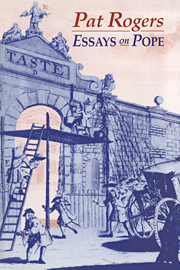Book contents
- Frontmatter
- Contents
- Preface
- Acknowledgements
- List of abbreviations
- 1 Pope and the syntax of satire
- 2 The politics of style
- 3 Form and pattern in the Pastorals
- 4 Windsor-Forest, Britannia and river poetry
- 5 Faery lore and The Rape of the Lock
- 6 Timon's Villa and Chatsworth
- 7 A drama of mixed feelings: the Epistle to Arbuthnot
- 8 The name and nature of Dulness: proper nouns in The Dunciad
- 9 Pope and the social scene
- 10 Blacks and poetry and Pope
- 11 The case of Pope v. Curll
- 12 Pope and his subscribers
- 13 The Burlington circle in the provinces: Pope's Yorkshire friends
- 14 Pope and the antiquarians
- Index
11 - The case of Pope v. Curll
Published online by Cambridge University Press: 18 December 2009
- Frontmatter
- Contents
- Preface
- Acknowledgements
- List of abbreviations
- 1 Pope and the syntax of satire
- 2 The politics of style
- 3 Form and pattern in the Pastorals
- 4 Windsor-Forest, Britannia and river poetry
- 5 Faery lore and The Rape of the Lock
- 6 Timon's Villa and Chatsworth
- 7 A drama of mixed feelings: the Epistle to Arbuthnot
- 8 The name and nature of Dulness: proper nouns in The Dunciad
- 9 Pope and the social scene
- 10 Blacks and poetry and Pope
- 11 The case of Pope v. Curll
- 12 Pope and his subscribers
- 13 The Burlington circle in the provinces: Pope's Yorkshire friends
- 14 Pope and the antiquarians
- Index
Summary
All students of Pope are familiar with his lengthy battles in print with the notorious bookseller Edmund Curll (1683–1747). The brash advertising methods of Curll helped to make him one of the key figures in what I have called elsewhere ‘the invention of publicity’. But Curll and Pope also tangled in the courts, and one could say that their skirmishes in print were no more than the extension of legal disputes by other means.
The Chancery suit of Pope v. Curll (1741) is significant on a number of different levels. It remains a leading case in English law as the first important test regarding copyright in personal letters. In fact, Lord Hardwicke's judgment constituted one of the first major interpretations in court of the celebrated Copyright Act of 1709. Additionally, the suit provides evidence of Pope's increasing willingness to go to the law in his final years – a development which may be associated with his friendship with Murray (the future Lord Mansfield), his counsel in this instance. It affords yet another chapter in the continuing battle with Curll. As it happens, the struggle of Pope versus Curll had gone on outside the courts for twenty-five years. On one occasion Curll had threatened to have recourse to ‘a Legal Remedy’ against Pope or his agents. And Curll himself had been obliged to appear before the House of Lords for allegedly contravening its standing orders. But it was only at this late stage that Pope deigned to apply to the courts for redress.
- Type
- Chapter
- Information
- Essays on Pope , pp. 184 - 189Publisher: Cambridge University PressPrint publication year: 1993

